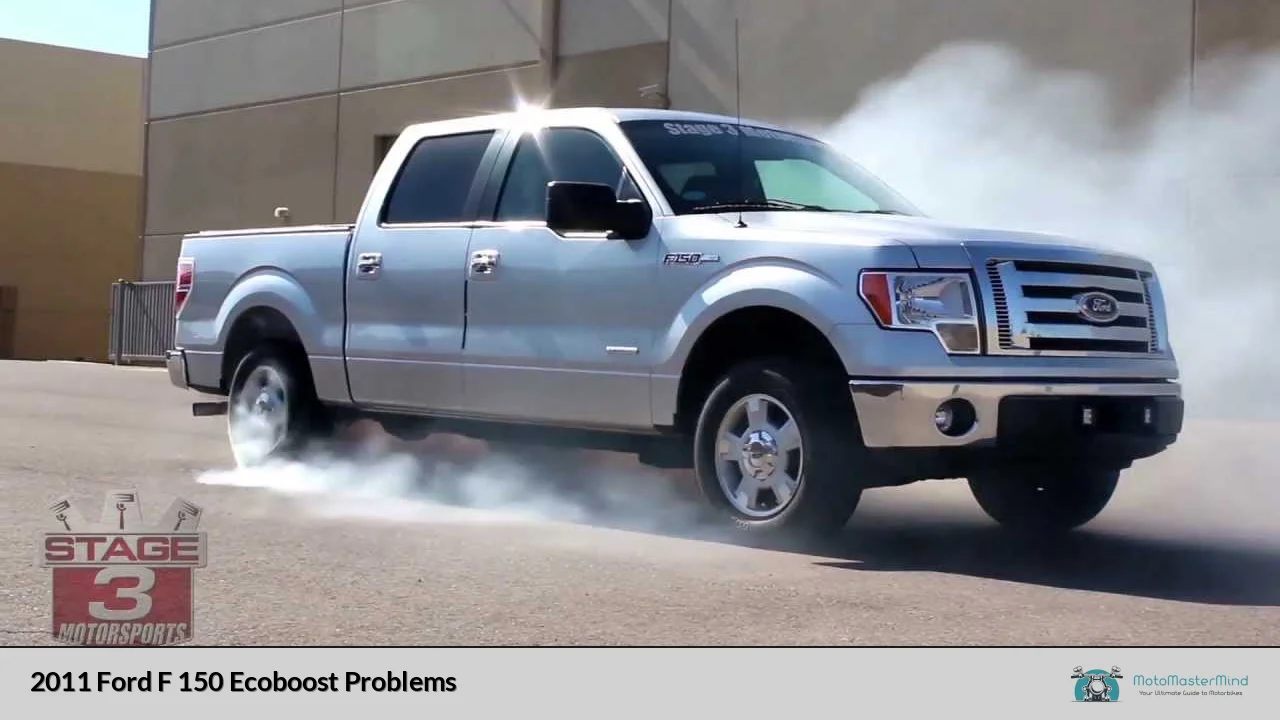Are you considering buying a 2011 Ford F-150 EcoBoost? Before making your decision, it’s crucial to be aware of the potential problems associated with this model. In this article, we’ll explore some common issues that owners have reported with the 2011 Ford F-150 EcoBoost.
One problem that has been frequently mentioned is the possibility of a misfire in the engine. Some owners have experienced a misfire under heavy acceleration or when towing heavy loads. This can lead to a loss of power and overall performance. If you’re planning on using your truck for demanding tasks, it’s important to keep this in mind.
Another concern that has arisen is related to the timing chain. Some owners have reported issues with the timing chain tensioners, which can cause a rattling noise coming from the engine. This noise may indicate a problem that requires immediate attention, as a failure of the timing chain tensioner can lead to serious engine damage.
Additionally, there have been reports of turbocharger failures in the 2011 Ford F-150 EcoBoost. Turbochargers are responsible for boosting the engine’s power, but they can be prone to wear and tear over time. Some owners have experienced issues such as excessive smoke, reduced power, or a whining noise coming from the turbocharger.
It’s worth mentioning that not all 2011 Ford F-150 EcoBoost vehicles will experience these problems. However, being aware of them can help you make an informed decision when purchasing a used vehicle. To mitigate these issues, regular maintenance and proper care are essential. Ensuring timely oil changes, using high-quality fuel, and following the manufacturer’s recommended maintenance schedule can go a long way in preventing potential problems.
While the 2011 Ford F-150 EcoBoost offers powerful performance and fuel efficiency, there are some known issues that owners have reported. Being aware of potential engine misfires, timing chain problems, and turbocharger failures can help you make an informed decision and take the necessary precautions to ensure your vehicle’s longevity. Remember to prioritize regular maintenance and consult with a trusted mechanic if you encounter any of these problems.
Unveiling the Roadblocks: Investigating the Persistent Issues Plaguing the 2011 Ford F-150 Ecoboost
When it comes to pickup trucks, the 2011 Ford F-150 Ecoboost had promised to revolutionize the industry with its innovative design and advanced features. However, as time passed, a number of persistent issues began to plague this popular vehicle, leaving owners frustrated and in search of answers. In this article, we will delve into the roadblocks that have hindered the performance of the 2011 Ford F-150 Ecoboost.
One of the major concerns faced by owners of the 2011 Ford F-150 Ecoboost is related to its engine. The Ecoboost technology was introduced to enhance fuel efficiency without compromising on power. Unfortunately, some users have reported engine misfires and loss of power, which can be attributed to faulty ignition coils and spark plugs. These issues not only affect the overall performance but also lead to decreased fuel economy.
Another roadblock that has troubled F-150 Ecoboost owners is related to the truck’s cooling system. Overheating problems have been reported, particularly during heavy towing or extreme weather conditions. This can result in engine damage and ultimately impact the longevity of the vehicle. Ford has acknowledged these concerns and released technical service bulletins to address the cooling system issues.
Furthermore, some drivers have experienced transmission-related challenges with the 2011 F-150 Ecoboost. Shuddering and hesitation during gear shifts have been reported, affecting the smoothness of the driving experience. These issues are often attributed to software glitches or problems with the torque converter. Ford has made efforts to rectify these concerns through software updates and, in some cases, replacing the transmission components.
Ultimately, while the 2011 Ford F-150 Ecoboost offered exciting possibilities, it has been marred by certain persistent issues. It is essential for owners to stay informed about these challenges and work closely with authorized service centers to resolve them. Ford has made efforts to address the concerns through technical bulletins and updates, demonstrating their commitment to customer satisfaction. By understanding and tackling these roadblocks head-on, owners can continue to enjoy the benefits of owning an F-150 Ecoboost while navigating the challenges along the way.
The Troubled Legacy: A Look into the Recurring Problems of the 2011 Ford F-150 Ecoboost
Introduction:
When it comes to pickup trucks, the 2011 Ford F-150 Ecoboost made quite a splash upon its release. With promises of enhanced fuel efficiency and impressive power, it seemed like a game-changer for truck enthusiasts. However, as time passed, a darker side emerged, revealing recurring problems that have marred its legacy. In this article, we delve into the troubled history of the 2011 Ford F-150 Ecoboost and shed light on the issues that have plagued this once highly regarded vehicle.
Engine Troubles:
One of the main culprits behind the Ecoboost’s issues lies in its engine. While the twin-turbocharged V6 engine offered exceptional horsepower and torque, it also brought along a host of reliability concerns. Owners reported instances of sudden loss of power, misfires, and issues with the turbochargers. These problems not only affected the performance of the vehicle but also led to costly repairs and frustrated owners.
Fuel Economy Letdown:
Another area where the 2011 Ford F-150 Ecoboost fell short was in achieving the promised fuel economy. Although marketed as a fuel-efficient option, many owners found themselves disappointed by the real-world MPG figures. The Ecoboost engine’s thirst for fuel under certain driving conditions left some scratching their heads, questioning the touted efficiency benefits.
Towing Woes:
Truck enthusiasts often rely on their vehicles for towing heavy loads, and here is where the Ecoboost ran into trouble again. Some owners experienced overheating issues while towing, leading to concerns about the engine’s durability and overall towing capability. For those who purchased the F-150 Ecoboost with towing in mind, these problems were particularly frustrating.
Conclusion:
The 2011 Ford F-150 Ecoboost arrived with much fanfare, promising a blend of power and efficiency. However, its legacy has been marred by recurring problems that have left owners dissatisfied. Issues with the engine, disappointing fuel economy, and towing woes have cast a shadow over this once highly regarded pickup truck. While subsequent models may have addressed some of these concerns, it’s essential to be aware of the troubled history associated with the 2011 Ford F-150 Ecoboost before making a purchase decision.
Owners Beware: Unraveling the Common Complaints Surrounding the 2011 Ford F-150 Ecoboost
Introduction:
Are you an owner of the powerful and dynamic 2011 Ford F-150 Ecoboost? If so, it’s crucial to be aware of some common complaints that have surfaced among owners. While the Ecoboost engine revolutionized the truck industry with its impressive power and fuel efficiency, a few issues have arisen over time. Let’s delve into these concerns and shed light on what you need to know.
Performance Woes: What’s the Deal?
One of the most frequent complaints regarding the 2011 Ford F-150 Ecoboost revolves around performance issues. Some owners have reported experiencing a decrease in power or acceleration, leaving them frustrated. However, it’s essential to note that such problems are not universal. Many owners continue to enjoy the exceptional performance of their trucks without any hiccups. With proper maintenance and regular servicing, these issues can often be avoided altogether.

Fuel Economy: Fact or Fiction?
Another complaint that has echoed within the Ford F-150 Ecoboost community is related to fuel economy. While the Ecoboost technology was designed to enhance efficiency, some owners argue that their trucks fall short in this aspect. It’s important to consider that various factors can influence fuel consumption, including driving habits, terrain, and cargo load. Despite occasional differences in mileage, the Ecoboost engine remains an excellent choice for those seeking a balance between power and efficiency.
Towing Capacity: Meeting Expectations?
The towing capacity of the 2011 Ford F-150 Ecoboost is undeniably impressive. Nevertheless, a subset of owners has expressed dissatisfaction with the truck’s towing capabilities under certain conditions. When pushing the limits of the truck’s maximum towing capacity, some have reported reduced stability or diminished performance. It’s crucial to stay within the recommended limits and make informed decisions to ensure optimal safety and performance.
Conclusion:
From Powerhouse to Predicament: Examining the Performance Challenges Faced by the 2011 Ford F-150 Ecoboost
Introduction:
When it comes to pickup trucks, the 2011 Ford F-150 Ecoboost was a game-changer. This innovative truck boasted impressive power and fuel efficiency, thanks to its EcoBoost engine technology. However, beneath its shiny exterior, the Ecoboost version faced some performance challenges that left both owners and enthusiasts scratching their heads.

Understanding the Ecoboost Engine:
The Ecoboost engine, introduced by Ford in 2009, aimed to combine the power of a V8 engine with the fuel economy of a V6. It utilized turbocharging and direct fuel injection to increase efficiency without compromising on performance. The 2011 F-150 Ecoboost was equipped with a 3.5-liter V6 engine capable of producing an astounding 365 horsepower and 420 lb-ft of torque.
Performance Challenges:
Despite its promises, the 2011 Ford F-150 Ecoboost encountered a few hiccups along the way, leaving some owners disappointed. One of the main issues was related to the truck’s intercooler design. Under certain conditions, such as towing heavy loads or driving up steep inclines, the intercooler could become overwhelmed, leading to reduced power and potential engine misfires.
Additionally, some owners reported experiencing problems with the engine’s direct fuel injection system. Carbon buildup on the intake valves caused rough idling, reduced acceleration, and decreased fuel efficiency. These challenges were especially prevalent in earlier versions of the Ecoboost engine, including the 2011 model.
Ford’s Response:

To address these performance challenges, Ford took several steps. They released technical service bulletins advising dealerships on how to clean the intake valves effectively and prevent carbon buildup. Furthermore, they made improvements to the intercooler design in subsequent model years, allowing for better heat dissipation and reducing the likelihood of performance issues.
Conclusion:
The 2011 Ford F-150 Ecoboost brought a new level of power and efficiency to the pickup truck market. While it faced some performance challenges related to the intercooler design and carbon buildup, Ford took proactive measures to address these issues. The subsequent model years benefited from these improvements, ensuring a better overall experience for owners. Despite its initial predicaments, the 2011 F-150 Ecoboost remains an important milestone in the evolution of pickup trucks, showcasing the ongoing pursuit of power and efficiency in the automotive industry.

